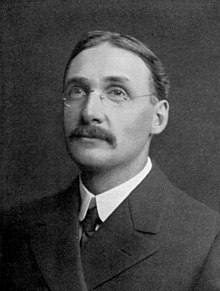Christian Archibald Herter (physician)
| Christian Archibald Herter | |
|---|---|
 |
|
| Born | September 3, 1865 Glenville, Connecticut |
| Died | December 5, 1910 |
| Nationality | American |
| Fields | pathologist |
| Alma mater | College of Physicians and Surgeons at Columbia University |
| Doctoral advisor | William H. Welch |
| Known for | gastrointestinal tract |
Christian Archibald Herter (September 3, 1865 – December 5, 1910) was an American physician and pathologist noted for his work on diseases of the gastrointestinal tract. He was co-founder of the Journal of Biological Chemistry.
Christian Archibald Herter was born in Glenville, Connecticut. His father, also Christian Herter, was a notable and wealthy artist and interior designer, head of the Herter Brothers. He was privately educated and began his medical degree at the early age of 15. By the age of 18, he had received an MD from the College of Physicians and Surgeons at Columbia University. He studied pathology under William H. Welch at Johns Hopkins University and traveled to Zurich to study under Auguste-Henri Forel.
Herter initially practiced mainly neurological medicine in New York City. His experience was captured in The Diagnosis of Diseases of the Nervous System, a manual he wrote for "students and practitioners" in 1892. Herter's interest in laboratory medicine led him to relinquish his medical practice and build a laboratory in the fourth floor of his house on 819 Madison Avenue. In 1897, he was appointed professor of Pathological Chemistry at University and Bellevue Hospital Medical College. His lectures were published in 1902.
Herter returned to his alma mater in 1903 as Professor of Pharmacology and Therapeutics. It was during this time that he researched diseases of the gastrointestinal tract. His work on celiac disease, which he called "intestinal infantilism", led to the eponym Gee-Herter disease. His important contribution was to highlight the retarded growth of affected children. Herter's theory as to the cause – that it was due to overgrowth and persistence of gram-positive bacterial flora normally belonging to the nursling period – failed to gain acceptance. However, he did correctly identify that any "attempt to encourage growth by the use of increased amounts of carbohydrates" led to relapse. This would later be discovered to be due to the gluten content of wheat.
...
Wikipedia
